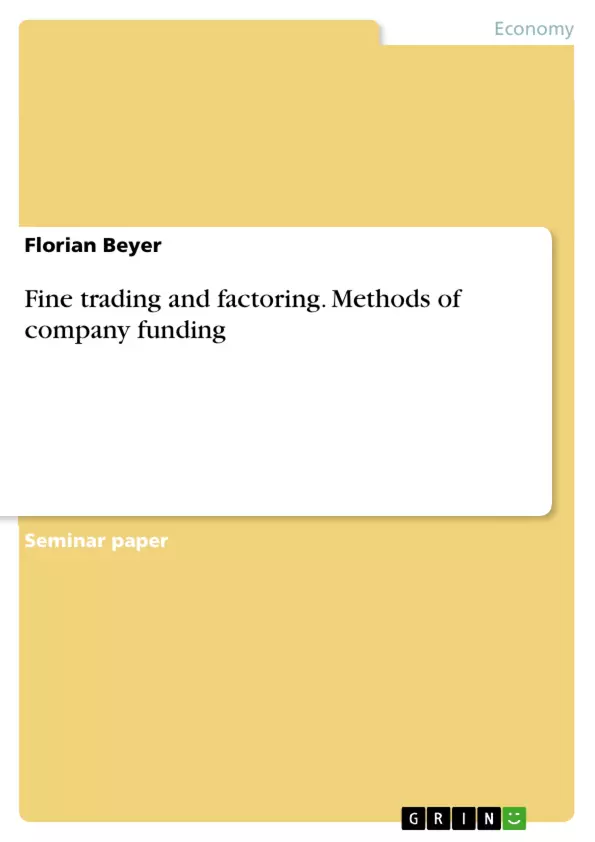A brief introduction of the Basel requirements is outlined. Following a definition and distinguishment of fine trading, factoring and reverse. Advantages and disadvantages are being explained as well. Finally, the influences on the balance sheet of the involved parties and on working capital are investigated.
Ten years ago, from 2007 to 2011 the global financial and the euro crisis have caused a peak in bankruptcies of many companies and even states have experienced financial difficulties. Since 2011, the total number of companies’ bankruptcies declines. In 2016, there were 21,518 insolvencies of companies in Germany. In contrast to this, in 2010, at the peak of the crisis there were 32,687 insolvencies. Overall, most of the companies in Germany are small and medium-sized enterprises (SME). In 2014, they represented 99.3 percent of all companies in Germany.
A proper working capital management is essential for all companies. Especially, SME are otherwise threatened to lack of liquidity or risk to become insolvent. Company funding has experienced profound changes lately. Basel I-III have extensively changed the regulatory circumstances for banks and their granting of credits. Banks must comply with changed regulatory capital and liquidity requirements as well as with new debt caps. This has a strong influence on company funding.
Therefore, the rating of a firm and the risk of an investment will increase the price of the company funding. The changed importance of working capital management and the new regulatory requirements have altered companies’ financing possibilities and partners. Moreover, the financial crisis has revealed their dependency on certain bankrollers.
Thus, other methods of financing suchlike factoring, fine trading, leasing and crowdfunding increased their importance. This paper examines fine trading and factoring regarding their differences, advantages, disadvantages and the methods’ influence on the balance sheet.
Table of Contents
- 1 Introduction
- 2 Reasons for new company funding methods
- 2.1 Implications of the Basel accords
- 2.2 Importance of working capital management
- 3 Finetrading and factoring – methods of company funding
- 3.1 Finetrading
- 3.2 Factoring
- 3.3 Reverse factoring
- 4 Finetrading and factoring – pros, cons and consequences
- 4.1 Pros and cons of finetrading and factoring
- 4.2 Consequences for the working capital and the balance sheet
- 5 Conclusion
Objectives and Key Themes
This paper examines finetrading and factoring as alternative methods of company funding, analyzing their differences, advantages, disadvantages, and their influence on the balance sheet. The paper delves into the reasons for the emergence of these new funding methods, exploring the implications of Basel accords and the growing importance of working capital management.
- The impact of Basel accords on traditional bank lending
- The increasing significance of working capital management
- The differences and similarities between finetrading and factoring
- The pros and cons of utilizing finetrading and factoring as funding sources
- The implications of these methods on a company's working capital and balance sheet
Chapter Summaries
- Chapter 1: Introduction: The chapter introduces the topic of alternative company funding methods, highlighting the economic context of the global financial and euro crisis and the resulting increase in bankruptcies. It emphasizes the importance of working capital management, particularly for small and medium-sized enterprises (SMEs), and how the changing regulatory landscape, particularly Basel accords, has influenced company funding practices.
- Chapter 2: Reasons for New Company Funding Methods: This chapter delves into the specific reasons behind the emergence of alternative funding methods. It focuses on the impact of Basel accords, which have led to stricter bank lending regulations and increased costs for companies, and the growing importance of efficient working capital management, particularly for SMEs.
- Chapter 3: Finetrading and Factoring - Methods of Company Funding: The chapter introduces finetrading and factoring as alternative funding options. It outlines the core aspects of each method, including their respective processes and key features.
- Chapter 4: Finetrading and Factoring - Pros, Cons, and Consequences: This chapter explores the advantages and disadvantages of finetrading and factoring, analyzing their impact on working capital and the balance sheet. It provides a comprehensive assessment of the potential benefits and risks associated with these methods.
Keywords
The paper explores key concepts within the field of company financing, particularly focusing on alternative methods like finetrading and factoring. These methods provide businesses with alternative avenues for accessing capital, especially amidst evolving regulatory environments and increasing working capital needs. The paper examines the implications of these methods on a company's financial health, delving into their impact on working capital management and balance sheet structure. Keywords include: company funding, Basel accords, working capital management, finetrading, factoring, balance sheet, SME, liquidity.
- Quote paper
- Florian Beyer (Author), 2017, Fine trading and factoring. Methods of company funding, Munich, GRIN Verlag, https://www.grin.com/document/536592




